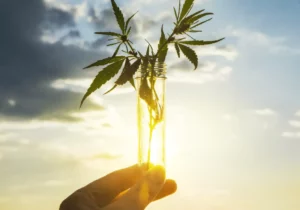Depression can affect anyone, even children, with symptoms such as sadness, lack of energy, and problems thinking clearly and managing the tasks of daily life. Conventional treatments for depression usually include therapy and a variety of prescription medications.
But a growing body of research reveals that the cannabis compound cannabidiol (CBD) may be as effective as prescription drugs are in relieving the symptoms of depression. And CBD can help without the side effects and risks of powerful pharmaceuticals that are designed to alter the chemistry of the brain.
FOLLOW US ON FACEBOOK & INSTAGRAM
What Is Depression?
Depression is a general term for a number of different conditions that share similar symptoms of:
- A persistent sad mood
- Loss of enjoyment or interest in life
- Problems with focus and concentration
Depression can have a number of different causes, and it’s possible to have more than one kind of depression at the same time. Depression has a number of health-based triggers such as:
- Hormone fluctuations related to menstruation, pregnancy and menopause
- Nutritional deficiencies like low levels of B vitamins
- Certain medications
- Neurological conditions such as Parkinson’s disease and multiple sclerosis
- Other severe health problems including cancer
- Genetics, since depression can run in families
Social factors can also lead to the development of depression. These include:
- Traumatic and stressful life events such as the death of a spouse or family member
- A troubled relationship
- The loss of a job
And people who experience traumatic events in childhood may have a greater risk of depression as adults. Depression can also appear alongside other kinds of mood disorders such as anxiety and PTSD.
In all of these situations though, the symptoms of depression generally arise from an imbalance in the brain’s systems for regulating mood. The levels of neurotransmitters responsible for positive feelings and calm such as serotonin and dopamine, or excitement and arousal like norepinephrine, may be too low or inhibited by the expression of other kinds of chemicals.
But recent studies have also shown that the endocannabinoid system (ECS), the body’s network of natural cannabinoid receptors, can play a powerful role in regulating mood and managing stress—and this is where CBD comes in.
The Problems With Depression Medications
Because depression takes so many different forms and affects so many people, the pharmaceutical industry has developed several types of drugs to target the production of mood- regulating neurotransmitters.
For example, drugs like Paxil and Prozac are selective serotonin reuptake inhibitors, or SSRIs. They inhibit the reuptake—or reabsorption—of serotonin, so that more of it’s available to the brain.
Another class of drugs called monoamine oxidase inhibitors, or MAOIs, which includes drugs like Nardil and Marplan, block an enzyme called monoamine oxidase. This enzyme affects the levels of norepinephrine, serotonin and dopamine.
But a first round of antidepressant medication is effective for just 30% of patients. And many patients with depression have to try several different medications before finding one, or a combination of drugs, that can manage their symptoms.
And even those antidepressants that are considered safest can have a long list of undesirable side effects such as:
- Drowsiness
- Dizziness
- Stomach upsets
- Weight gain
Some also cause undesirable mood changes such as increased anxiety and suicidal ideation.
For those reasons, a growing number of people struggling with depression have found relief with cannabis, thanks to the potent mood-regulating properties of CBD, a cannabis compound that doesn’t make consumers feel high like tetrahydrocannabinol (THC) does, and which occurs abundantly in all strains of Cannabis sativa.
The Science Behind How CBD Can Help With Depression
Along with the psychoactive compound THC, and numerous other active compounds and terpenes, CBD affects the body’s own endocannabinoid receptor system as well as many other processes. This complex network of receptors responds both to natural cannabinoids produced by the body and those from outside sources like cannabis.
Science has identified two main cannabinoid receptors, CB1 and CB2, which respond both to natural endocannabinoids and to cannabis compounds. In the brain, these receptors play a role in expressing serotonin, dopamine and other mood-regulating neurotransmitters.
CBD actually has a very limited binding effect on either of these receptors. But CBD can create substantial mood-boosting effects by acting on other pathways in the brain that support the production of serotonin and other chemicals, which boost mood.
Glutamate is an abundant neurotransmitter that plays an essential role in numerous processes related to memory, learning and mood. It also supports the production of gamma aminobutytric acid, or GABA, a calming chemical.
Recent studies reveal that CBD is able to enhance levels of serotonin and glutamate by mimicking the action of serotonin on a specific receptor called the hydroxytryptonine serotonin receptor, or 5HT1A.
Anandamide is an endocannabinoid, a cannabis-like chemical the body produces naturally. It’s named after ananda, the Sanskrit word for bliss, and it produces feelings of well-being and happiness.
But anandamide’s effects are usually short-lived, thanks to the effects of another chemical called FAAH, which breaks it down. CBD has been shown to inhibit the effects of FAAH, so that it breaks down anandamide less quickly and allows this mood-boosting chemical to remain available longer.
CBD has a long list of other healing benefits, too. It can:
- Fight inflammation and infection
- Reduce pain
- Interfere with processes that lead to cancer
RELATED: HOW CBD CAN CURB CHRONIC INFLAMMATION
These benefits can also contribute to easing the symptoms of depression that are associated with many chronic health conditions.
For all of these reasons, many people with depression and other health issues are finding that they can either completely stop using their prescription medications, or reduce the dosage considerably, by taking cannabis.
How to Take CBD to Relieve Depression
For thousands of years, people have used cannabis as a way to boost mood and calm anxiety. Now, science reveals why this could be true—and how cannabis compounds, especially CBD, can be used safely to treat the many symptoms of depression.
Just about any way of consuming CBD-rich cannabis products will provide relief from depression. According to HelloMD’s Dr. Richard Kim, CBD can help with all serotonin-related mood disorders. And it provides the same benefits no matter how it’s taken—whether ingested as edibles or sublingual tinctures, smoked or vaped.
Because cannabis can affect people in different ways at different dosages, it may take some experimenting to find the right amount of CBD to make a difference in your symptoms.
Although some people opt to use CBD instead of pharmaceuticals, others find that taking CBD alongside prescription medications can help them reduce their use of these drugs and experience fewer side effects from the ones they do use. But it’s important to keep in mind that different classes of antidepressants act differently on the brain’s systems for regulating mood and to adjust CBD dosages accordingly.
“CBD is safe to take with most drugs at reasonable doses,” says Dr. Kim. But that dose can depend on the kind of antidepressants you’re currently taking. Dr. Kim recommends taking about 20 mg of CBD three times a day in combination with drugs from the SSRI, SSNRI and NDRI classes.
But with tricyclic antidepressants and MAOIs, “I’d advise using smaller and more frequent doses of CBD—5 mg three to four times a day,” Dr. Kim adds.
Depression is the leading cause of disability throughout the world—and for many people, standard prescription medications may not be effective or safe. Whether you take CBD alone or in combination with conventional depression treatments, this common cannabis compound has the power to ease the many symptoms of depression.
Photo credit: Warren Wong






